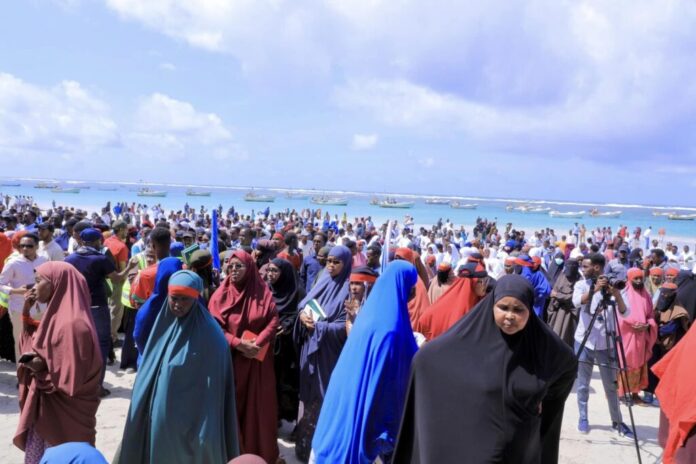On Friday, the terror group Al-Shabaab once again struck the heart of Mogadishu, targeting innocent civilians at Liido Beach. The attack claimed at least 50 lives and injured nearly 100, according to various sources. Many of the victims were young men and women enjoying their weekend at the white sandy beach.
This tragic event is part of a decade-old problem for Somalia, where terrorist attacks have consistently taken a heavy toll on civilian lives. It marks the second such attack on a civilian venue in Mogadishu since July this year.
The recurring theme in discussions among Somalis, both online and offline, is whether there will ever be a meaningful solution to countering terror attacks. The straightforward answer is: terrorism cannot be stopped if the ideology that nurtures it remains unchecked.
Violent extremism thrives on the justification of using violence to oppose different ideas. Al-Shabaab’s violence are symptoms of a chronic disease that has not been adequately addressed.
Violent extremism, as defined by scholars, involves the use, support, or legitimization of violence to achieve social, political, or religious goals. What sets Violent extremism apart from other violent acts is its broader context within the extremist’s vision of political and social issues.
A core element of this ideology is the justification of violence to change cultures or practices deemed “wrong” by certain groups. Al-Shabaab’s extremist interpretation of Islam is a prime example. However, countering this violence becomes exceedingly difficult when the same ideology thrives within government institutions responsible for stopping it.
The Liido Beach Attack: Government and Extremist Overlap
The Liido Beach attack highlights a disturbing overlap between the rhetoric of government officials and militant groups.
Al-Shabaab, known for extorting businesses and bombing those who resist, justified the Liido Beach attack by condemning the location as a site of “unholy, un-Islamic and western culture” referring the social gathering and the music.
Shockingly, Al-Shabaab’s messaging broadcast its online platforms and local radio, included a clip from the Mayor of Mogadishu, Yusuf Hussein Jimale (Madaale), who had previously criticized young revelers at Liido Beach, describing their activities as “immoral and evil” authorizing a new morality unit police to deal with “night clubs” in Mogadishu.
This rhetoric echoes Al-Shabaab’s justification for violence.
The mayor’s attacks extended to Boosh Treat, a popular night restaurant and bar in the city, which he labeled as “evil and un-Islamic,” leading to its closure. The restaurant’s owner, fearing for her life, relocated to Nairobi.
Al-Shabaab had targeted both Boosh Treat and the adjacent Pizza House multiple times, using similar justifications.
The principle that witnessing an evil practice necessitates forceful change is employed by both extremist government officials and militant groups alike. Public justification of violence by officials can be perceived as state endorsement, emboldening extremist groups and aiding their recruitment efforts.
Mogadishu’s police, under Commander Mahdi Omar Muumin (popularly known as Moalim Mahdi, a former Al-Shabaab defector), have launched campaigns against “immorality,” arresting young TikTok users and sentencing them to jail for reasons ranging from ‘not wearing the full-length robes to spreading immorality’.
This mirrors Al-Shabaab’s strict enforcement of dress codes and behavior in areas under its control.
Prime Minister Hamza Abdi Barre has also supported extremist rhetoric, further complicating efforts to counter radicalization. His endorsement of groups like Hamas, which share violent ideologies with Al-Shabaab, undermines the fight against extremism.
When government officials publicly justify violence against democratic ideals, it severely undermines efforts to counter violent extremism. It erodes trust, legitimizes violence, increases polarization, undermines the rule of law, creates radicalization pathways, violates human rights, and impairs community relations.
Effective counter-extremism demands cooperation and trust between communities and the government. Peaceful Somalis are indeed tired of both political and religious extremism. The government needs to lead by example and first fight its extremists within.
The violence that led to the Liido Beach attack and others are symptoms of extremist ideology. To combat it, we must address the root cause: the ideology that breeds it.


